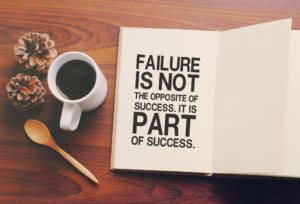
“The only ones who fear failure are those who have never tasted it.” – Simon Sinek
Bessemer Ventures is a terrific Venture Capital firm.
They’ve had a lot of hits (Yelp, Pinterest, Linked In) and quite a few misses.
Such as not investing in Facebook.
Here’s how Bessemer explains its failure to see the potential in founders Mark Zuckerberg and Eduardo Saverin:
“Jeremy Levine (a Bessemer partner) spent a weekend at a corporate retreat in the summer of 2004 dodging persistent Harvard undergrad Eduardo Saverin’s rabid pitch. Finally, cornered in a lunch line, Jeremy delivered some sage advice. ‘Kid, haven’t you heard of Friendster? Move on. It’s over!’”
This week, Facebook’s market cap was approaching $606 billion—that’s billion with a B ($$$$).
I don’t know how many of us are prepared to reckon so openly (and humorously) with mistakes or let alone share them with the world.
But the truth is, if we are honest, we all miss from time to time.
I recently read an article by Bill Taylor, a founder of Fast Company magazine, who suggests that to be a better leader we ought to put together a “failure resume.”
It sounds a little odd, but the point is we often learn more from our failures than our successes.
I think that’s true, but only if we are self-aware and take the time to delve into why something didn’t work. Sometimes it’s hard to examine a failure, because failing can be painful and costly both emotionally and financially.
But if we remember that success is never final and failure is hardly ever fatal, we may be encouraged to take a deeper look at ventures that didn’t quite pan out.
As an entrepreneur, I have had some hits (admittedly minor, but I’m still swinging) and many misses.
As someone who works with a phenomenally successful entrepreneur, we have also had our share of hits (some really good ones) and some misses (it happens).
As a civic entrepreneur (aka a former elected official), there are a few votes I regret but many more (fortunately) that I’m proud of. I say fortunate because unlike business, where you can usually come back to fight another day, in politics once you’ve cast your vote, you can’t get it back.
So anyway, because I like and respect Bill Taylor and have read him for years, I thought I would sit on the couch one night and take his advice. I did my “failure resume” while watching “The Bachelorette”, which some would say should be added to my failure list. So here goes…
We failed to save the old Boca News—(although we did manage keep it alive long enough to sell it).
This was a high degree of difficulty mission since the paper struggled when Knight Ridder owned it and really struggled when they sold it, leaving us without a deep pocketed corporate parent. It was a painful exercise to keep afloat until it sold, because we had to let a lot of really good people go and those faces are forever etched in my mind.
For four years, I had some successes and some misses with a brand consultancy that helped companies bring their product to market.
We got a few clients shelf space nationally, but the amount of work we were doing (relative to the fees we were generating didn’t add up). What I failed to consider was that each start-up considered their product their baby (as they should). As a result, there was never enough attention we could pay to any one client that matched their expectations. We made some money, but we pulled the plug.
My first two entrepreneurial ventures also failed despite enjoying some early success.
As a young journalist, my colleagues and I approached my parent company with an idea—could we start a sports publication that would cover everything from youth sports to adult rec leagues?
Our corporate parent, called us “intrapreneurs” because they partnered with us on our effort, providing sales, if we produced, designed and distributed the paper which we called “Boca Raton Sportscene.”
I still think it was a good idea and readers loved it but….we were charged expenses (printing $$$) and being less than sophisticated negotiators we got killed. It was only when I eventually left to start my own—successful publishing company (finally! a win)—did I realize that we were being charged how should I say it…aggressively.
But I learned a lesson and I relished the opportunity I was given. It also stoked my desires to give it a go on my own. And so I did. But before I left, I also ghost wrote books for clients, including custom biographies—again we were profitable but if you added the time versus the compensation well let’s just say I’d be better off doing just about anything else.
Since then, there have been real estate deals, hot sauce, beverages, more newspapers, events, consulting gigs, my own book, race horses, investments in other ventures, a magazine etc. etc.
Luckily, a few ideas worked. But they were all really challenging.
That’s why I admire entrepreneurs and creatives—because it’s hard work and it’s always uncertain.
I’ve been under capitalized and well capitalized, I’ve worked with experienced people and some.. ahem… others. I’ve seen great ideas crash and burn and some ideas I thought were questionable break through. In my mind, that’s the fun of it all.
So consider a failure resume, because once you lay it out there you might realize that those failures actually led to your successes.
Speak Your Mind